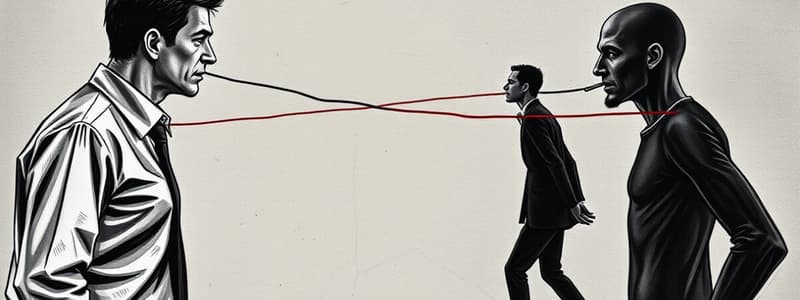Podcast
Questions and Answers
What does the conflict theory of deviance focus on?
What does the conflict theory of deviance focus on?
- Cultural norms
- Social inequality and power (correct)
- Social equality
- Biological factors
What occurs in Merton's Strain Theory?
What occurs in Merton's Strain Theory?
Deviance occurs when culturally approved goals cannot be achieved by culturally approved means.
What is labeling theory?
What is labeling theory?
The belief that individuals subconsciously notice how others see or label them.
What does Structural Functionalism propose?
What does Structural Functionalism propose?
What does Differential Opportunity Theory state?
What does Differential Opportunity Theory state?
What is Feminist Theory?
What is Feminist Theory?
What causes crime according to Cultural Conflict Theory?
What causes crime according to Cultural Conflict Theory?
What does Differential Association Theory argue?
What does Differential Association Theory argue?
What is control theory?
What is control theory?
What is legitimated suppression?
What is legitimated suppression?
What influences perceptions of crime in communities?
What influences perceptions of crime in communities?
What are reasons law enforcement engages in racial profiling?
What are reasons law enforcement engages in racial profiling?
What are the advantages and disadvantages of the studied research methodology?
What are the advantages and disadvantages of the studied research methodology?
What role does attachment play in explaining deviant behavior?
What role does attachment play in explaining deviant behavior?
Flashcards are hidden until you start studying
Study Notes
Conflict Theory of Deviance
- Focuses on social inequality and power dynamics in defining deviance.
- Wealthy individuals influence the labeling of deviant acts and the punishment for deviants.
- Highlights disproportionate treatment of minorities in the criminal justice system.
Merton's Strain Theory
- Suggests deviance arises when individuals cannot achieve culturally approved goals through legitimate means.
Labeling Theory
- Proposes that individuals develop self-identity based on how they are labeled by others.
- Emphasizes the impact of societal reactions on individual behavior over time.
Structural Functionalism
- Presents a view that each societal element serves a function, maintaining equilibrium.
- Asserts that moral training constrains individual behavior.
Differential Opportunity Theory
- States that in addition to legitimate opportunities, there are illegitimate opportunities that are not equally available to all social classes.
Feminist Theory
- Examines gender inequalities in society.
- Analyzes how gender shapes social dynamics and structures.
Cultural Conflict Theory
- Argues that crime results from conflicting cultural norms between different social groups.
- Discusses the blending of subcultural norms with dominant societal values.
Differential Association Theory
- Claims deviant behavior is learned from close relationships and immediate environments.
- Highlights how models of deviance influence individual actions.
Control Theory
- Suggests strong societal bonds prevent deviant behavior.
- Focuses on understanding the factors that deter individuals from engaging in deviance.
Legitimized Suppression and Policing in Latino Neighborhoods
- Demographics affect the level of police surveillance in areas.
- Surveillance leads to feelings of unfair profiling and adverse treatment.
- Media labeling of communities as gang-influenced escalates police misconduct and justifies profiling tactics.
Understanding Legitimated Suppression
- Defined as making suppression lawful, impacting perceptions of gang-related crime.
- Media portrayal of gangs justifies aggressive policing.
- "Broken windows theory" promotes focusing on minor offenses to mitigate overall crime levels.
Racial Profiling and Policing Efficiency
- Demographic factors contribute to perceptions of criminality in poor minority communities.
- Racial profiling leads to community distrust of law enforcement, reducing collaboration in crime-solving efforts.
Research Methodology Evaluation
- Critiques the study's focus on a small, homogeneous sample (Latino gangs), limiting generalizability to urban populations.
- Researcher's background as a former gang member may bias the perspective on policing.
Role of Attachment and Internalization
- Attachment to societal norms helps prevent deviant behavior.
- Individuals with strong ties to societal expectations are likely to internalize these norms, reducing deviant actions.
Studying That Suits You
Use AI to generate personalized quizzes and flashcards to suit your learning preferences.




